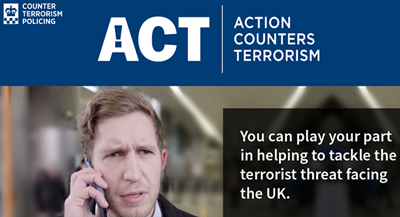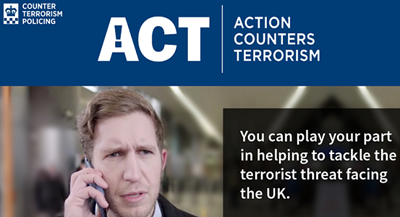06 Mar 2017
Police call on public to help tackle increasingly complex and varied terrorist threat
* New campaign asks public to act on their instincts to help tackle terrorism
* Senior officer praises public contribution but warns threat is becoming increasingly complex and varied
* First ever CT policing podcasts reveal untold stories on how attack was foiled with help from public
With the terror threat becoming increasingly complex and varied, police are calling on communities to act on their instincts to help prevent atrocities taking place in the UK and overseas.
The appeal comes as new figures reveal that information from the public has assisted counter terrorism police in a third of the most ‘high-risk’ investigations, helping keep communities safe.
The UK’s most senior counter terrorism officer, Assistant Commissioner Mark Rowley, will launch a new 'Action Counters Terrorism', or 'ACT', campaign today (Monday March 6) urging the public to report suspicious activity to the police.
Mr Rowley will tell an audience of community and business representatives in Manchester that information from the public continues to help keep people safe by playing a significant part in recent successes in countering terrorism. However, officers need even more information to build better intelligence pictures on individuals or groups plotting attacks.
This comes as the threat, which remains 'Severe' meaning an attack is highly likely, continues to diversify and expand. This is seen in cases where terrorists have been able to reach across the world to radicalise often vulnerable, volatile or chaotic individuals and groups, and inspire and direct them using instant and secure communications.
Mr Rowley says: “It is very encouraging that in a third of cases involving our most serious terrorist suspects we have benefited from information from the public. The number of calls and online reports we receive is increasing. This is testament to people’s trust in the police - but now we are appealing for even more.
“Counter terrorism policing is working hard to keep the public safe. Together, the UK intelligence community (MI5, SIS, GCHQ) and police have disrupted 13 UK terrorist attack plots since June 2013."
“However, advances in technology make it more complex and challenging for us to spot would-be terrorists because it's easier for them to be in contact with others and be radicalised in a relatively short space of time.
“The threat is becoming more varied and the move towards low-tech attacks on crowded places, like those we have seen in major European cities and beyond, makes it even more important everyone remains vigilant and acts by calling us confidentially if they are concerned about suspicious activity.”
Security Minister Ben Wallace adds: “The horror of recent terrorist attacks in Europe and beyond is a shocking reminder of the threat we all face. We know that we are not immune as the threat to the UK is currently assessed as 'Severe', meaning an attack is highly likely.
“Our police and security and intelligence agencies work tirelessly, often unseen, day in and day out to keep families and communities across the country safe. The public also have a vital role to play as they are ideally placed to notice activity which is unusual.
“I welcome the police’s ACT campaign which raises awareness about what to look out for and provides people with easy-to-access advice.
“Ultimately, this is a job for all of us. I encourage people to follow the campaign’s message to remain alert but not alarmed by the threat and report any concerns to the police.”
Last year (April 2015 to March2016) the Anti-Terrorist Hotline, received more than twice the number of calls on the previous year with just over 22,000 people making contact. Officers hope the figures will continue to increase if more can be done to encourage people to call or report online.
Research to support the ACT campaign looked at public attitudes towards counter terrorism policing. Over 80 percent of respondents said that it was important for communities to work with police to prevent terrorism. However, a quarter of those surveyed said they might not report their suspicions because of fears over wasting police time, and 39 percent were unsure about what suspicious behaviour might look like.
Mr Rowley adds: “Our call and report numbers are increasing and research has shown many people want to play their part, but some worry they might be wasting our time or they are not sure what sort of activity might be suspicious. So we want to allay those concerns and help them to help us.”
More information on what to look out for can be found at gov.uk/ACT where you can report your concerns online or by calling police confidentially on 0800 789321.
Podcast is a counter terrorism campaign first
As part of the new campaign, counter terrorism policing has produced its first ever podcast. ‘Code Severe’ is a two-part series, narrated by actor Mark Strong, revealing previously untold stories of how terrorist attacks on UK soil were prevented from those involved. The stories are told by counter terrorism detectives, bomb disposal and surveillance officers – many speaking publicly for the first time - as well as senior officers, witnesses and the terrorists themselves.
The podcasts give never heard before accounts of police action to protect the public. In one episode: 'Multiple Bombings', a former Special Branch officer explains the race against time to secure vital evidence right under the nose of a terrorist suspect in a highly sensitive covert operation. We also hear from a member of the public who acted on her instincts after seeing something suspicious and called police, helping detectives locate core ingredients for a massive bomb.
Assistant Commissioner Mark Rowley says: “Our first ever podcast series explains, in a compelling and engaging way, how members of the public acted on their instincts and helped save lives – in the hope of encouraging others to do the same. By being more open about the threat and our work to confront it we hope the public will feel better informed and more confident in coming forward.”
"I hope the podcasts will demonstrate that one piece of information shared with the police can make a massive difference. At the same time, if information turns out to be nothing of concern we will still be happy to have checked it out.”
Notes about our research:
The research used to shape the ACT campaign was commissioned by CT policing and carried out by an external agency. In total 2198 adults across England, Wales and Scotland were asked about attitudes towards aspects of CT policing. Key finders were:
73% of respondents said they were concerned about terrorism.
17% (top score) of respondents said the main reason for concern is that terrorism is unpredictable and can affect anyone, anywhere.
75% of respondents said police were working hard to prevent terrorism.
79% of respondents said it was not just the responsibility of the police to tackle terrorism.
83% of respondents said it was important communities work together to defeat terrorism.
29% of respondents said they might not report suspicious behaviour in case their suspicions were incorrect.
39% of respondents said they were unsure what kind of activity they should be reporting.
26% of respondents said they might not report suspicious behaviour as they wouldn't want to be seen as wasting police time.
In addition, CT Policing analysed 100 of our most high-risk current/ongoing operations. In a third of these cases we found that we had received information from the public that assisted the investigation, including new leads or corroborating facts. This has helped us build a stronger intelligence and evidence picture to enable us to confront and manage the threat posed by these suspects.
Contact information
Communications office
By phone: 0800 538 5058
By email: press.office@npcc.police.uk


